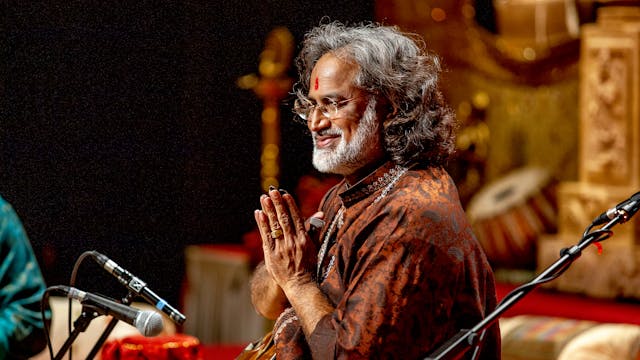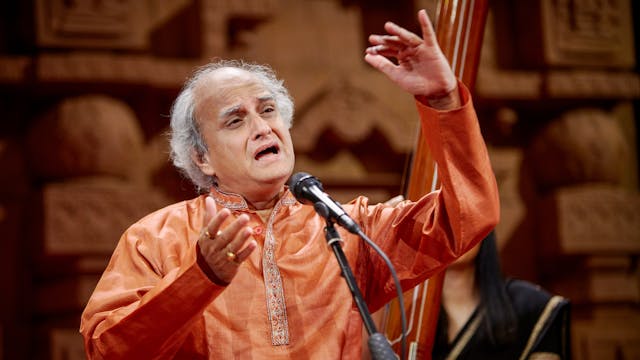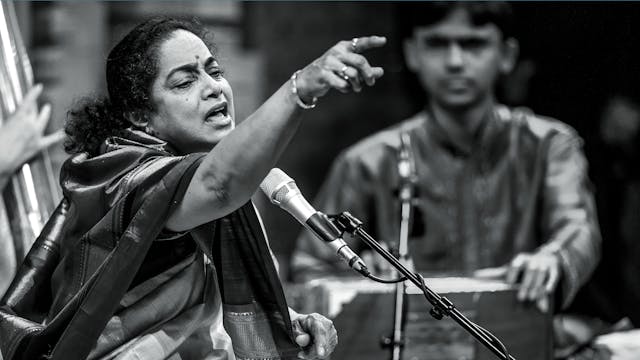Ramakant Gaikwad | Marwa
Evening Ragas
•
12m
Filmed and recorded live at Mulshi, Maharashtra
Musicians:
- Ramakant Gaikwad (khayal)
- Ramkrishna Karambelkar (tabla)
- Abhinay Laxmikant Ravonde (harmonium)
- Gayatri Gaikwad & Dr. Aparna Shenoy (tanpuras)
Raag Marwa, Thaat: Marwa, Samay: sunset
Recorded live against the stunning, rugged landscape of Mulshi, Maharashtra, we present to you one of the most melodious voices that has emerged from the Dharwad-Belgaon belt of western coastal India – Ramakant Gaikwad. In this video, Gaikwad brings the delightful blend of Kirana gharana fused with the masculine Patiala style in his sedative, lustrous voice.
Gaikwad performs the awe-inspiring twilight raga Marwa, a melodic scale that has always intrigued scores of musicians and listeners alike with its deeply reflective appeal and a compelling monastic personality. Therefore, encapsulating Marwa into a twelve-minute performance respecting its powerful and reclusive nuances can be a formidable task - but Gaikwad does not disappoint remotely. He begins with a vilambit Ektaal bandish, elaborating the raga with heavy emphasis upon its nyasa swar Dha (6th). The corresponding nyasa swar Re (2nd) is focused upon with a careful aversion of Sa (1st) in both the ascending and descending phrases in the vistaar, sargams and taans during the expansion of the raga.
Gaikwad sums up the short account with an iconic composition in drut Teental – Guru Bin Gyan Na Pawe – a eulogy on how pertinent a good teacher’s role is in the realm of passing on knowledge. Ramkrishna Karambelkar gives compatible support on the tabla. The vacillating temperatures of the outdoor location interfering ominously with the tuning of the membranous tabla were commendably dealt with by Karambelkar without stalling the flow of the recital at any cost. Abhinay Laxmikant Ravonde adds textures to the melody with a sound, grounded accompaniment on the harmonium.
Raag Marwa has a somber mood, it is sung during sunset and projects an intense, meditative emotion. One of the greatest Indian classical vocalists of all time, late Ustad Amir Khan, has contributed volumes to the Marwa repository with his emphasized delineation of Dha (6th) in the lower octave. This spin has imbued the raga with the introspective personality of a Yogi in a mood of renunciation.
An ancient melody that is both a thaat (parent scale) and a parent raga to a host of extremely powerful and popular ragas, Marwa represents the transition from day to night and opens a pathway to enter Kalyan Thaat. It uses 6 notes in its ascent and descent. The dominant note is komal Re (flat 2nd) and the sub-dominant is Dha (6th). It omits Pa (5th) from the scale and deploys teevra Ma (sharp 4th). Its vadi swar or dominant note is Re and its sub-dominant or samvadi swar is Dha.
Its arohana and avarohana are as follows:
S D. n r G M D N S’
S’ N D M G r S, n D n r S
Up Next in Evening Ragas
-
Vishwa Mohan Bhatt | Gawati
Recorded at Darbar Festival 2007, on 14th April, at the Phoenix Theatre, Leicester.
Musicians:
- Pandit Vishwa Mohan Bhatt (mohan veena)
- Pandit Yogesh Samsi (tabla)Raag Gawati, Thaat: Khamaj, Samay: Late Afternoon
Pandit Vishwa Mohan Bhatt gives a soulful rendition of a this evening raag, ...
-
Pandit Ulhas Kashalkar | Darbari Kanada
Recorded at Darbar Festival 2011, on 24th April, at King's Place.
Musicians:
- Pandit Ulhas Kashalkar (vocal)
- Pandit Suresh Talwalkar (tabla)
- Chinmay Kolhatkar (harmonium)
- Sameehan Kashalkar (supporting vocals and tanpura)Raag Darbari Kanada; Thaat: Asavari; Samay: Midnight
Darbari...
-
Shruti Sadolikar | Savani Nat
Recorded at Darbar Festival 2012, on 29th Sepember, at the Southbank Centre, London.
Musicians:
- Shruti Sadolikar (Jaipur-Atrauli gharana)
- Vishwanath Shirodker (tabla)
- Murad Ali (sarangi)
- Tanmay Deochake (harmonium)
- Ranjana Ghatak & Shobana Patel (tanpuras)Raag Savani Nat, Th...



